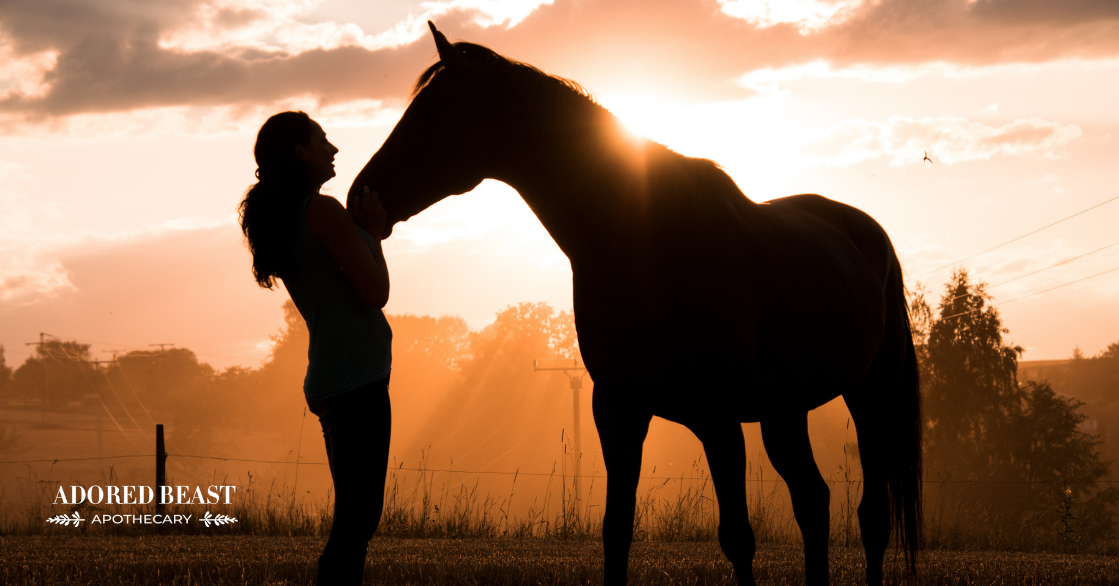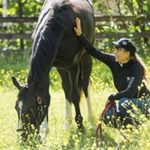Well, here we are, talking about poop again. It seems to be our favourite subject! And since we’re so darn passionate about gut health (and overall health), talking so much about poop does make sense…
Today, let’s talk about horse poop – or more specifically, species-appropriate probiotics for horses. Wait, what? Don’t worry, we’ll get there!
We all know that observing your horse’s poop is an integral part of making sure that your horse is feeling well. Most horse people are experts at assessing poop: the size, smell, moisture content, and frequency. When any aspect of your horse’s manure doesn’t seem right, it’s time to help them out. If it’s a chronic issue, it’s time to make some changes to your overall management program for your horse.
And, yes, horse poop can help point you in the right direction!
A Link Between Poop and Colic?
Most horse people know what to look for when it comes to poop. When your horse’s bowel movements are small, dry, and/or infrequent, this is a big red flag. It can be a precursor to colic, so it’s extremely important to rectify the issue immediately. Colic is the number one medical cause of death in horses. Research continues, but there are still no absolute solutions for this issue. That’s because there’s no quick fix! And, there are several reasons that horses get colic, including gas colic, obstruction, and twisting of the intestine.
Horses of any age can get colic, and recent studies show a link between microbiome health and colic in horses:
- A 2018 study by the Equine Veterinary Journal shows that horses that experienced colic had fewer bacterial species and lower diversity than healthy horses that had no incidence of colic. (1)
- Another study found that during the presentation of colic in thoroughbred horses, fecal samples contained significantly different microbial communities than healthy horses and higher levels of pathogenic bacteria (including Clostridium difficille) that are known causes of gastro-intestinal inflammation in horses. (2) The same study also noted that the diet and management of horses vastly affects their gut microbial communities.
Recognizing the Signs
Gut inflammation is a known precursor to colic so we must do everything we can to ensure that this invisible issue isn’t occurring without our knowledge. The signs are often there but sometimes it’s hard to tell. You need to learn to read the subtle signs your horse gives you to make a good prevention plan for your horse.
These two factors are important:
1. Energy Level – how much energy does your horse have? Do they seem to have low stamina? Lots of nervous energy? Or can they keep up with the exercise program you are providing?
2. Body Condition – this includes more than simply what your horse weighs. It’s also extremely important to determine your horse’s ability to develop muscle, particularly topline, and their ability to maintain it. If they can’t, it could be related to improper diet, workload, and/or problems to nutrient absorption in the gut. Often times, it’s a mix of all 3.
Even when your horse is struggling with a seemingly unrelated illness, gut health often plays a role. A healthy gut contributes to:
- immunomodulation (inflammation control in all body systems) (3)
- reduced neurologic inflammation (4) (5)
- lowered risk of development of arthritis (6)
- reduced renal toxicity (7) (8)
- increased nutrient absorption (9)
- reduced incidence of viral and bacterial infection (10)
- improved bowel habits (11) (12)
- insulin sensitivity modulation and satiety (13)
- reduced cancer promotion (14) (15)
Microbiome Testing
The microbiome is like a fingerprint that is unique to each horse in relativity to their diet, environment, and health status. Human and animal studies show that the microbiome has the ability to affect overall health. We also know that environmental influencers affect it.(16) It, in turn, has the ability to affect your horse on a genetic level. So regardless of your horse’s breed or health status right now, their environment and diet plays a larger role in influencing genetics than random chance. The good news is, this means that you have a lot more control over your horse’s health than you might think!
When your veterinarian does a regular fecal test, it will only show parasite load (eg. worms). Additionally, a fecal culture will only show pathogenic strains of bacteria that may be high (including E. coli, salmonella, clostridium, etc.). To understand the overall health of your horse’s gut microbial community, you need to go for a more specialized test.
There are a few select labs in the US, Canada and Europe that do this testing. If you’re having chronic issues with colic, colitis or other GI-related issues in your horse, it’s certainly something to consider.
Species-Appropriate Probiotics for Horses
Did you know that most probiotics on the market today come from cows? That’s right. Most human and animal probiotic supplements come from cows. That includes probiotics for horses. Now, that doesn’t mean they’re not beneficial – they are – they’re just not species-appropriate.
Species-appropriate means that the probiotic in question comes from the same species as the one you are giving it to.
When you find a species-approbate (also called species-specific) probiotic, it’s actually specific to a species. That could be a dog, cat, human, or horse! This means each species has strains that are unique and genetically specific to that animal. Often this makes the strains more viable, and better able to provide host-specific benefits!
And where do equine-specific probiotics come from? Yep, you guessed it: the manure of healthy horses!
Equine-specific probiotic strains have the unique ability to address horse health because they are tied to the genetic and metabolic traits of horses. They are far more targeted than the typical strains you will see in other probiotics labelled for equines. That being said, only a few strains of equine probiotics exist so it’s important to give them with a variety of other beneficial microbes in order to establish diversity, including the typical beneficial strains.
[READ THIS NEXT] Probiotics can’t thrive with our prebiotics. Here’s where to find them!
The Assessment Protocol for Eligible Species-Appropriate Probiotics for Horses
When species-appropriate probiotics for horses are selected, they are rigorously tested. These are a few of the things that are tested/requirements that must be met:
- the strain must be isolated from the healthy host species
- genomic sequencing is determined
- a cell binding assay is established (to confirm species-specific cell lines)
- confirmation of postbiotic production (eg. bacteriocin and other pathogen-protective agents)
- antibiotic susceptibility profile testing (eg. ensuring that they do not cause antibiotic resistance)
- bile salt tolerance
- gastric acid tolerance
- immunomodulation assays (eg. production of short chain fatty acids involved in immune system modulation & health)
- animal feed trials (surviving from mouth to tail in equine host, short chain fatty acid impact assessment, abundance assessment)
Remember: the more variety, the better. As previously mentioned, a diverse microbiome is the key to gut health, and species-appropriate probiotics for horses are essential!
References
- BEVA Equine Veterinary Journal: Differences in the equine faecal microbiota between horses presenting to a tertiary referral hospital for colic compared with an elective surgical procedure, 2018
- The Open Veterinary Journal: Changes in the gut microbiome and colic in horses: Are they causes or consequences? 2022
- Journal of the Polish Biochemical Society & Polish Academy of Sciences: Immunomodulatory potential of gut microbiome-derived short-chain fatty acids, 2019
- Therapeutic Advances in Gastroenterology: Effects of probiotics on gut microbiota: mechanisms of intestinal immunomodulation and neuromodulation, 2012
- Neurotherapeutics: Microbiome, immunomodulation and the neuronal system, 2018
- FEMS Microbiology Reviews: Talk to your gut: the oral-gut microbiome axis and its immunomodulatory role in the etiology of rheumatoid arthritis, 2019
- American Journal of Physiology: Chronic kidney disease and the gut microbiome, 2019
- Journal of Renal Nutrition: The leaky gut and altered microbiome in chronic kidney disease, 2017
- Journal of Animal Science: HORSE SEPCIES SYMPOSIUM: Can the microbiome of the horse be altered to improve digestion? 2016
- Frontiers in Microbiology: Infectious threats, the intestinal barrier and its Trojan Horse: dysbiosis, 2019
- Frontiers in Veterinary Science: The role of the canine gut microbiome and metabolome in health and gastrointestinal disease, 2020
- Plos One: Comparison of the fecal microbiome of healthy horses and horses with colitis by high throughout sequencing of the V3-V5 region of the 16S rRNA gene, 2012
- Journal of Experimental Biology: The effect of diet change and insulin dysregulation of the faecal microbiome in ponies, 2020
- Nature Reviews Cancer: The microbiome and cancer, 2013
- The American Cancer Society: The role of the microbiome in cancer development and therapy, 2017
- Frontiers in Genetics: Inflammation-Associated Microbiota Composition Across Domestic Animals, 2021












